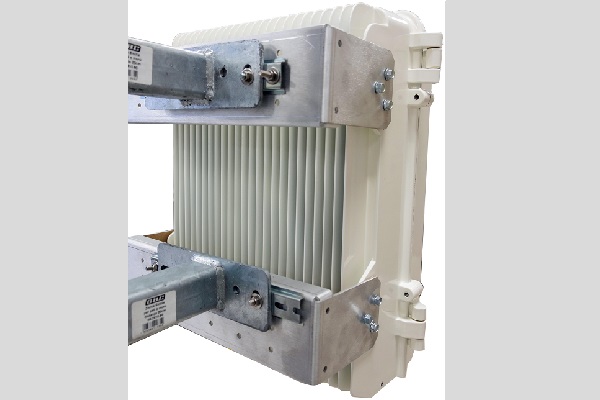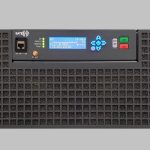Introduced for UHF broadcasters last year, the self-contained, modular Maxiva PMTX-1 provides network operators and local broadcasters with versatile options to provide low-power service and fill coverage gaps in dispersed regions.
GatesAir, a Thomson Broadcast subsidiary dedicated to wireless content delivery, last year unveiled its Maxiva PMTX-1 outdoor transmitter series for UHF broadcasters, bringing a self-contained, fully weatherproof transmitter series to market. Now, it is widening its product line by introducing a VHF TV and DAB Radio offering.
Same as its UHF predecessor, the Maxiva PMTX-1 integrates a low-power transmitter or transposer/translator to support a diverse array of VHF and DAB use cases, from filling coverage gaps to delivering focused broadcast content as a spot transmitter. Its rugged, telecom-grade enclosure makes the PMTX-1 impervious to weather elements, with adaptability to any climate or outdoor environment thanks to its sealed protective shell. The VHF version covers channels 7 through 13 and is mainly marketed for use in North America and the Asia-Pacific (APAC) region. In mixed spectrum networks, broadcasters can take in a UHF signal and translate it to a VHF output, for example.
The DAB version is viable for countries that have adopted DAB/DAB+ as its digital radio standard in regions outside North America, with especially strong business opportunities in Europe and APAC. In Europe, the PMTX-1 simplifies DAB broadcast service for tunnels, complex terrain that limits coverage, and areas shadowed by buildings and other obstacles.
Ted Lantz, Vice President, Product Line Management, GatesAir, said: “We work with many TV broadcasters in the western half of the United States and Canada that rely on signal hops between multiple sites to cover broadcast markets challenged by mountainous terrain or widely dispersed territories. If you look at DAB networks in Europe, we have many customers seeking better ways to add low-power transmitters to road tunnels to ensure uninterrupted service for travellers. They also want cost and power-efficient options to install low-power transmitters and gap fillers outdoors in very remote, often harsh climates to cover small villages and populations. The PMTX-1 provides a host of new deployment options to simplify network coverage and penetrate these very hard-to-reach areas in ways that make financial sense.”
Lantz cites one example where broadcasters can save money by using the pole-mount installation option. “We are working with a customer in the US that intends to add a single-bay VHF dipole antenna to the side of a cellular tower and mount the PMTX-1 on an adjacent pole,” he said. “There are no facility costs involved; the broadcaster is simply renting the tower space at a very reasonable cost.”
In addition to pole-mount configurations, the PMTX-1 also mounts securely to building structures and traditional broadcast towers, providing broadcasters and network operators with seemingly endless outdoor installation scenarios. That makes the PMTX-1 suitable for single-frequency network (SFN) configurations where multiple transmitters operate on the same frequency to maximize signal penetration. The PMTX-1 is also available for analogue TV networks (100 W), with a field-upgradeable path to DTV (50 W for ATSC, DVB-T, DVB-T2 and ISDB-Tb).
Field operations are also simplified through the Maxiva PMTX-1’s clever one-piece design, which removes all moving parts and air filters to eliminate most maintenance requirements. The sealed metal housing efficiently removes heat from the internal circuitry and performs well in extreme temperatures and humidity levels. This innovative and effective approach to heat management maximizes efficiency and keeps utility costs low.
The PMTX-1 VHF and DAB version is almost analogous to the UHF version in design characteristics and componentry, with the mask filter and power amplifier as the only exceptions. The PMTX-1’s optional RF receiver input supports flexible options for translator and transposer configurations and will reliably regenerate content for very targeted coverage areas at low power levels. Broadcasters can add optional inputs to support DVB-S/S2 receivers and IP transport streams, and accept broadcast content and data from alternate sources.
“These additional inputs are also very helpful for solving coverage problems,” added Lantz. “By adding a satellite card, we can receive content from satellite and retransmit that information to a local population. That is very helpful for DAB Radio, where we see a lot of very remote sites that lack a network or microwave connection, and satellite is the only option. This is all about solving problems for our customers no matter where their viewers live.”
















































































